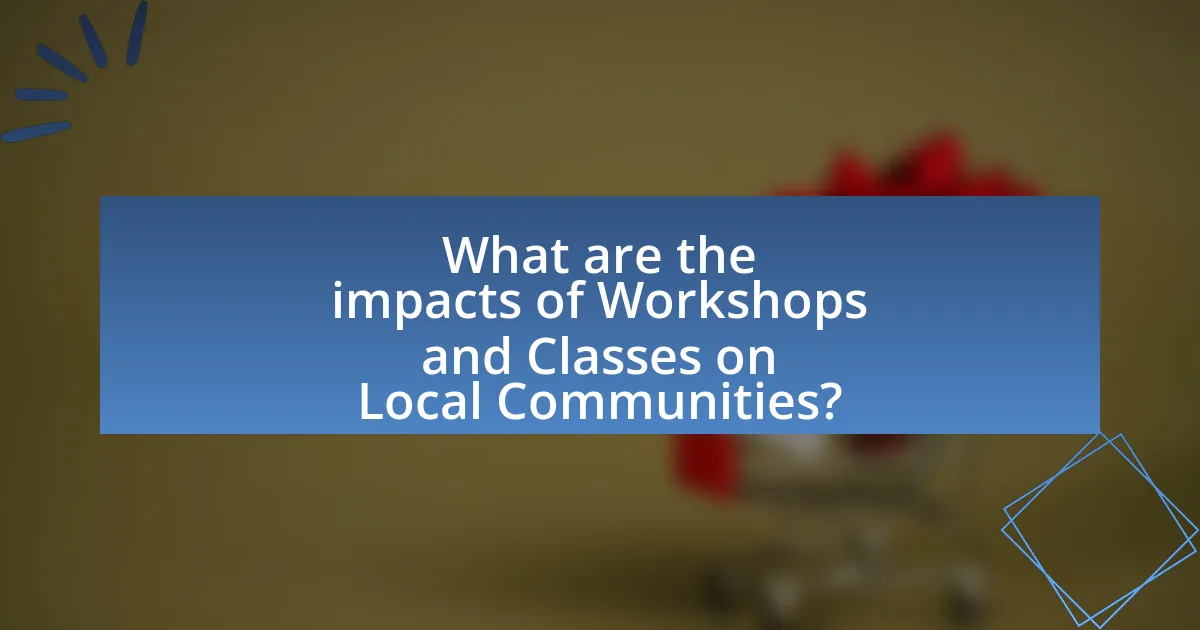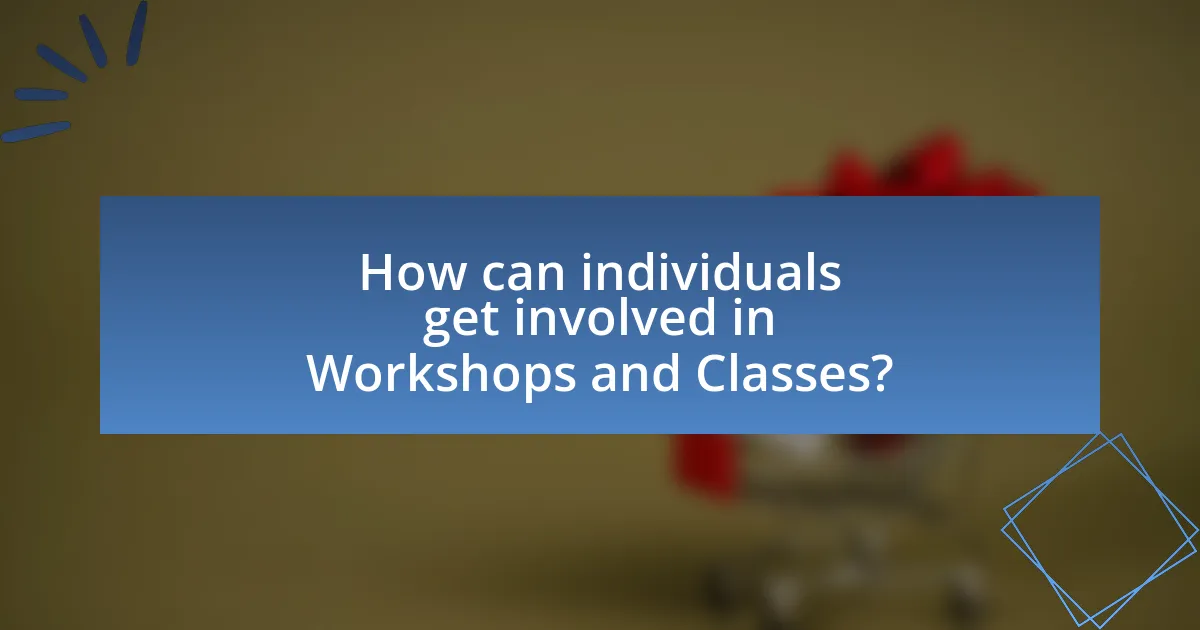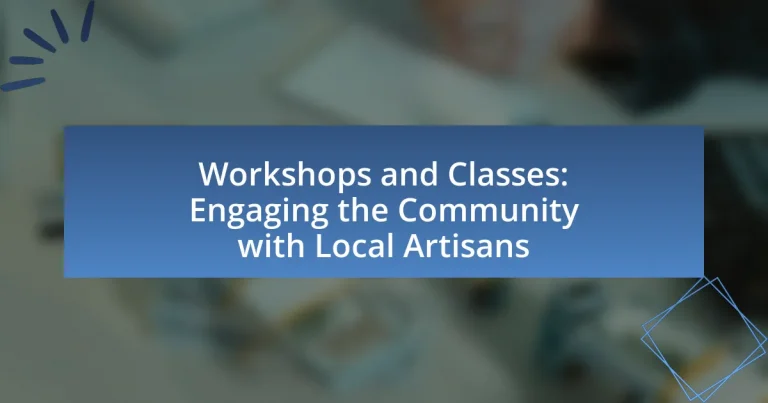Workshops and classes with local artisans provide hands-on learning experiences that enable individuals to acquire skills in various crafts, such as pottery, woodworking, and culinary arts. These programs not only promote skill development and personal growth but also enhance community engagement by fostering social interaction and supporting local economies. Participants benefit from learning traditional techniques and cultural significance from skilled artisans, which helps preserve local heritage. The article explores the impact of these workshops on community cohesion, economic development, and mental well-being, while also addressing the challenges organizers face in engaging diverse community members.

What are Workshops and Classes with Local Artisans?
Workshops and classes with local artisans are hands-on learning experiences where individuals can engage directly with skilled craftspeople to acquire specific skills or knowledge related to traditional or contemporary crafts. These sessions often focus on various disciplines such as pottery, woodworking, textile arts, or culinary skills, allowing participants to create tangible products while learning techniques and cultural significance behind the craft. Such workshops foster community engagement by promoting local culture and supporting artisans, who often rely on these platforms to share their expertise and sustain their livelihoods.
How do Workshops and Classes benefit the Community?
Workshops and classes benefit the community by fostering skill development and enhancing social cohesion. These educational programs provide individuals with opportunities to learn new skills, such as crafting, cooking, or technology, which can lead to personal growth and increased employability. Additionally, workshops and classes often bring together diverse groups of people, promoting interaction and collaboration among community members. This interaction can strengthen community bonds and create a sense of belonging. Research indicates that community engagement through such programs can lead to improved mental health and well-being, as participants report higher levels of satisfaction and reduced feelings of isolation.
What skills can participants learn from Local Artisans?
Participants can learn various practical skills from local artisans, including woodworking, pottery, textile crafting, and metalworking. These skills are often taught through hands-on workshops where artisans share their expertise and techniques. For example, a study by the Craft Council of Canada highlights that engaging in such workshops not only enhances participants’ craftsmanship but also fosters creativity and problem-solving abilities. Additionally, learning from local artisans helps preserve traditional techniques and promotes cultural heritage within the community.
How do these activities foster community engagement?
Workshops and classes foster community engagement by providing hands-on learning experiences that connect individuals with local artisans. These activities create opportunities for participants to interact, collaborate, and share knowledge, thereby strengthening community bonds. For instance, when individuals engage in crafting or cooking classes led by local experts, they not only acquire new skills but also build relationships with fellow participants and the artisans themselves. This interaction promotes a sense of belonging and encourages community members to support local businesses and cultural practices, ultimately enhancing social cohesion and community identity.
Why are Local Artisans important in Workshops and Classes?
Local artisans are important in workshops and classes because they provide authentic skills and knowledge that enhance the learning experience. Their expertise allows participants to engage in hands-on activities that reflect local culture and craftsmanship. For instance, artisans often share traditional techniques that have been passed down through generations, fostering a deeper appreciation for local heritage. This direct interaction not only enriches the educational aspect but also supports community engagement and economic sustainability by promoting local talent and craftsmanship.
What unique perspectives do Local Artisans bring to their craft?
Local artisans bring cultural heritage and community identity to their craft, enriching their work with traditional techniques and local materials. This perspective often reflects the history and values of the community, as artisans incorporate local stories and practices into their creations. For example, artisans in regions with a rich textile history may use specific weaving techniques passed down through generations, showcasing their unique cultural narratives. Additionally, local artisans often prioritize sustainability by using eco-friendly materials sourced from their surroundings, which aligns with community values and environmental consciousness. This blend of tradition and innovation not only enhances the quality of their craft but also fosters a deeper connection between the artisans and the community they serve.
How do Local Artisans contribute to cultural preservation?
Local artisans contribute to cultural preservation by maintaining traditional crafts and practices that embody the heritage of their communities. Through workshops and classes, artisans share their skills and knowledge with community members, ensuring that techniques such as weaving, pottery, and woodworking are passed down through generations. For instance, in many regions, artisans conduct hands-on sessions that not only teach the craft but also explain its historical significance, thereby fostering a deeper appreciation for cultural identity. This active engagement helps to sustain local traditions, as evidenced by studies showing that communities with vibrant artisan workshops report higher levels of cultural continuity and pride.
What types of Workshops and Classes are available?
Various types of workshops and classes are available, including pottery, painting, woodworking, and cooking. These workshops are designed to engage the community by providing hands-on experiences led by local artisans. For instance, pottery classes often focus on techniques such as wheel throwing and hand-building, while painting workshops may cover different mediums like acrylics and watercolors. Additionally, woodworking classes typically teach skills related to furniture making and carving, and cooking classes often explore regional cuisines and culinary techniques. Each type of workshop aims to foster creativity and skill development within the community.
What are the most popular crafts taught by Local Artisans?
The most popular crafts taught by local artisans include pottery, woodworking, weaving, and painting. Pottery classes often focus on techniques such as wheel throwing and hand-building, allowing participants to create functional and decorative items. Woodworking workshops typically cover skills like carving, joinery, and furniture making, appealing to those interested in creating custom pieces. Weaving classes introduce various techniques, including loom weaving and macramé, enabling participants to produce textiles. Painting workshops often explore different mediums, such as acrylics and watercolors, fostering creativity and artistic expression. These crafts are popular due to their hands-on nature and the opportunity for community engagement.
How can participants choose the right Workshop or Class for them?
Participants can choose the right workshop or class by assessing their interests, skill levels, and learning objectives. Identifying personal goals, such as whether they want to learn a new skill, enhance existing abilities, or explore a hobby, helps narrow down options. Additionally, reviewing class descriptions, instructor qualifications, and participant reviews provides insights into the workshop’s relevance and quality. Research indicates that aligning personal interests with class offerings increases satisfaction and retention rates, as seen in community engagement studies.
How can Workshops and Classes be effectively organized?
Workshops and classes can be effectively organized by establishing clear objectives, selecting qualified instructors, and creating a structured schedule. Clear objectives ensure that participants understand the purpose and expected outcomes, which enhances engagement and satisfaction. Qualified instructors bring expertise and credibility, fostering a productive learning environment. A structured schedule, including time for instruction, hands-on practice, and feedback, allows for a balanced experience that maximizes learning. Research indicates that well-organized workshops lead to higher participant retention and satisfaction rates, as evidenced by a study published in the Journal of Educational Psychology, which found that structured learning environments significantly improve educational outcomes.
What challenges do organizers face in engaging the community?
Organizers face several challenges in engaging the community, primarily including lack of awareness, limited resources, and diverse interests among community members. Lack of awareness can hinder participation, as potential attendees may not know about the workshops and classes being offered. Limited resources, such as funding and volunteer support, can restrict the ability to promote events effectively and provide quality experiences. Additionally, the diverse interests and demographics within the community can make it difficult to create programs that appeal to everyone, leading to lower engagement levels. These challenges are supported by studies indicating that effective community engagement often requires tailored approaches that consider local needs and preferences.

What are the impacts of Workshops and Classes on Local Communities?
Workshops and classes significantly enhance local communities by fostering skill development, promoting social interaction, and supporting local economies. These educational programs provide residents with opportunities to learn new skills, such as crafting or cooking, which can lead to increased employability and personal growth. Additionally, they create spaces for social engagement, allowing community members to connect, collaborate, and build relationships, thereby strengthening community bonds. Economically, workshops and classes often utilize local artisans as instructors, which supports local businesses and encourages the circulation of money within the community. For instance, a study by the National Endowment for the Arts found that community arts programs can lead to a 30% increase in local economic activity, demonstrating the tangible benefits of such initiatives.
How do Workshops and Classes promote local economies?
Workshops and classes promote local economies by fostering skill development and encouraging consumer spending within the community. These educational events create opportunities for local artisans to share their expertise, which not only enhances the skill set of participants but also increases the demand for locally produced goods and services. For instance, a study by the National Endowment for the Arts found that arts-related workshops can lead to a 20% increase in local business revenue as participants often purchase materials and services from nearby vendors. This cycle of spending supports local jobs and stimulates economic growth, reinforcing the importance of community engagement through workshops and classes.
What role do Local Artisans play in economic development?
Local artisans play a crucial role in economic development by fostering local entrepreneurship and creating jobs. Their craftsmanship not only preserves cultural heritage but also stimulates local economies through the production and sale of handmade goods. According to a report by the Craft Industry Alliance, the craft sector contributes approximately $44 billion to the U.S. economy annually, highlighting the significant economic impact of local artisans. Additionally, local artisans often source materials from nearby suppliers, further enhancing community economic ties and supporting local businesses.
How can Workshops and Classes attract tourism to the area?
Workshops and classes can attract tourism to the area by offering unique, hands-on experiences that showcase local culture and craftsmanship. These activities allow visitors to engage directly with artisans, learn traditional skills, and create authentic souvenirs, enhancing their connection to the destination. For example, a study by the National Endowment for the Arts found that cultural tourism, which includes workshops and classes, can significantly boost local economies by increasing visitor spending and extending their stay. This engagement not only enriches the tourist experience but also promotes the preservation of local traditions and crafts, making the area more appealing to potential visitors.
What social benefits arise from community engagement in Workshops?
Community engagement in workshops fosters social cohesion and enhances community ties. By bringing individuals together, workshops create opportunities for collaboration, skill-sharing, and mutual support, which can lead to stronger relationships among participants. Research indicates that community-based workshops can improve social networks, as evidenced by a study published in the Journal of Community Psychology, which found that participants reported increased feelings of belonging and trust within their communities after engaging in collaborative activities. Additionally, these workshops often promote inclusivity and diversity, allowing various community members to share their unique perspectives and experiences, further enriching the social fabric.
How do Workshops and Classes enhance social cohesion?
Workshops and classes enhance social cohesion by providing a platform for individuals to interact, collaborate, and build relationships within their community. These structured environments foster communication and teamwork, allowing participants to share skills and knowledge, which strengthens community bonds. Research indicates that community engagement activities, such as workshops, can lead to increased trust and cooperation among residents, as evidenced by a study published in the Journal of Community Psychology, which found that participation in community-based programs significantly improved social ties and collective efficacy among participants.
What impact do these activities have on mental health and well-being?
Engaging in workshops and classes with local artisans positively impacts mental health and well-being by fostering social connections and enhancing creative expression. Participation in these activities reduces feelings of isolation and loneliness, as individuals interact with others who share similar interests. Research indicates that social engagement is linked to lower rates of depression and anxiety, with a study published in the Journal of Happiness Studies showing that community involvement significantly boosts overall life satisfaction. Additionally, creative activities have been shown to improve mood and cognitive function, as evidenced by findings from the American Journal of Public Health, which highlight that art participation can lead to increased emotional resilience and stress relief.

How can individuals get involved in Workshops and Classes?
Individuals can get involved in workshops and classes by researching local offerings through community centers, art studios, or online platforms that list events. Many organizations provide schedules and registration details on their websites, allowing individuals to sign up for specific sessions that interest them. For example, community centers often host workshops led by local artisans, providing hands-on experiences in various crafts. Engaging with social media groups or local bulletin boards can also reveal opportunities for participation, as these platforms frequently share announcements about upcoming classes.
What are the best practices for participants in Workshops?
The best practices for participants in workshops include being prepared, actively engaging, and providing constructive feedback. Preparation involves reviewing any materials or topics in advance to maximize understanding and participation. Active engagement means asking questions, sharing experiences, and collaborating with others, which enhances the learning environment. Providing constructive feedback helps facilitators improve future workshops and fosters a culture of continuous improvement. These practices are supported by research indicating that participant engagement significantly enhances learning outcomes, as noted in studies on adult education methodologies.
How can participants maximize their learning experience?
Participants can maximize their learning experience by actively engaging in hands-on activities and asking questions during workshops and classes. Research indicates that experiential learning enhances retention and understanding, as demonstrated by Kolb’s Experiential Learning Theory, which emphasizes the importance of direct experience in the learning process. Additionally, collaborating with local artisans allows participants to gain practical insights and skills, further enriching their educational journey. Engaging with peers and instructors fosters a supportive learning environment, which has been shown to improve overall satisfaction and outcomes in educational settings.
What should participants prepare before attending a Workshop?
Participants should prepare relevant materials and knowledge before attending a workshop. This includes reviewing any pre-workshop materials provided by the facilitator, gathering necessary tools or supplies specified in the workshop description, and familiarizing themselves with the workshop topic to enhance engagement and learning. For example, if the workshop focuses on pottery, participants should bring their own clay and tools if required, and have a basic understanding of pottery techniques to maximize their experience.
What resources are available for finding Workshops and Classes?
Online platforms such as Eventbrite, Meetup, and local community centers are valuable resources for finding workshops and classes. These platforms aggregate various events, allowing users to search by location, date, and type of activity. For instance, Eventbrite hosts a wide range of workshops, from art to cooking, and provides user reviews and ratings, enhancing the decision-making process for participants. Additionally, local community centers often list classes that focus on skills taught by local artisans, fostering community engagement and support for local talent.
How can online platforms help connect individuals with Local Artisans?
Online platforms can connect individuals with local artisans by providing a digital marketplace where artisans can showcase their work and services. These platforms facilitate direct communication between artisans and potential customers, allowing individuals to discover unique, locally-made products and services. For instance, platforms like Etsy and local community websites enable artisans to create profiles, list their offerings, and engage with customers through reviews and direct messaging. This connection not only promotes local craftsmanship but also supports community engagement by encouraging individuals to participate in workshops and classes offered by artisans, thereby fostering a deeper appreciation for local culture and skills.
What community centers or organizations offer Workshops and Classes?
Community centers and organizations that offer workshops and classes include local arts councils, community colleges, and non-profit organizations focused on arts and education. For example, the YMCA frequently provides a variety of classes ranging from arts and crafts to fitness workshops. Additionally, local arts councils often host workshops led by artisans in the community, allowing participants to engage directly with skilled professionals. These centers typically aim to foster community engagement and skill development through hands-on learning experiences.
What tips can enhance the experience of engaging with Local Artisans?
To enhance the experience of engaging with local artisans, actively participate in workshops and classes they offer. Engaging directly in hands-on activities allows individuals to learn skills, understand the artisan’s craft, and appreciate the effort involved in creating handmade products. Research indicates that experiential learning, such as participating in workshops, significantly increases retention of knowledge and fosters a deeper connection to the craft (Kolb, 1984). Additionally, asking questions and showing genuine interest in the artisan’s story and techniques can create a more meaningful interaction, as artisans often value sharing their passion and expertise.


